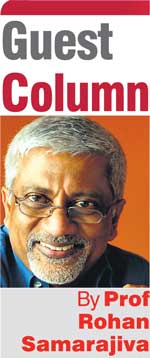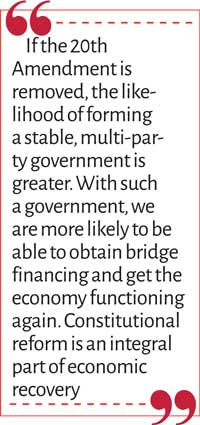Sunday Feb 15, 2026
Sunday Feb 15, 2026
Wednesday, 25 May 2022 00:22 - - {{hitsCtrl.values.hits}}

 In 2020, Sri Lanka spent $ 10.5 million to import rice. In 2019 rice imports cost $ 12.8 million. But in 2021, a year without a drought, the Central Bank reports that Sri Lanka spent $ 73 million on rice imports, approximately seven times the amount spent in previous years. In the same year, the Government paid $ 6.7 million for a shipment of sub-standard “organic” fertiliser. These are illustrative examples, not the total cost, of the damage caused by the decision of President Gotabaya Rajapaksa to ban chemical fertiliser and agrochemicals one year ago, disregarding the advice of scientists with the relevant expertise. We will know the true cost by August 2022.
In 2020, Sri Lanka spent $ 10.5 million to import rice. In 2019 rice imports cost $ 12.8 million. But in 2021, a year without a drought, the Central Bank reports that Sri Lanka spent $ 73 million on rice imports, approximately seven times the amount spent in previous years. In the same year, the Government paid $ 6.7 million for a shipment of sub-standard “organic” fertiliser. These are illustrative examples, not the total cost, of the damage caused by the decision of President Gotabaya Rajapaksa to ban chemical fertiliser and agrochemicals one year ago, disregarding the advice of scientists with the relevant expertise. We will know the true cost by August 2022.
President Rajapaksa was repeatedly advised from 2020 to restructure the country’s debt. If he had initiated the restructuring then, before the IMF staff determined that Sri Lanka’s public debt is unsustainable in March 2022, we would have been eligible for support under the Rapid Financing Instrument (RFI) of the International Monetary Fund (IMF). It would have been possible to keep the economy running and the people supplied with necessities. We are no longer eligible. The economy is crashing, and the people are suffering. And the suffering will continue unless bridge financing is obtained.
These are the consequences of just two errors the President has admitted. There were many more.
The US had a similarly inept and incompetent President in Donald Trump. During his four-year term, he was impeached twice though the Senate Republican majority protected him. Despite a much stronger case existing against President Rajapaksa, the Sri Lankan Constitution does not contain a realistic impeachment procedure. Thus, the only alternative has been to protest in the streets to compel him to resign.
Even today, this incompetent, foolish and arrogant man is making decisions critical to the wellbeing of all Sri Lankans. His presence is slowing the formation of a stable, all-party government which appears to be a prerequisite for obtaining bridge financing so the economy can be saved from collapse while the debt negotiations are completed.
The only alternative we have, while maintaining the pressure for him to resign, is to clip his wings by rescinding the 20th Amendment that he and his brothers rammed through Parliament in 2020. If the 20th Amendment is removed, the likelihood of forming a stable, multi-party government is greater. With such a government, we are more likely to be able to obtain bridge financing and get the economy functioning again. Constitutional reform is an integral part of economic recovery.
 What is wrong with the 20th Amendment?
What is wrong with the 20th Amendment?
What are the elements of this pernicious amendment? As part of the effort to defeat the 20th Amendment, I wrote thus in September 2020:
“The overall thrust of the 20th Amendment is the concentration of power in the Presidency, a single individual, and the disempowerment of those who may pose difficult questions or bring to bear other perspectives… Many would agree that such a concentration of power would be unwise if the President in question was Mr Maithripala Sirisena, now an object of ridicule to many. But a sizeable number would say that the current President is a technocrat who appreciates the value of expertise and has the support of many professionals, such as those from Viyath Maga. This President, they would claim, has been elected to take decisive action without the distractions of Parliamentary oversight and judicial challenges.”
Then, I had to illustrate the ill-effects of concentration of power using the President’s wrong use of data and the practice of regulation under conditions of incomplete information. Today, no evidence has to be presented. The whole country is paying the price for his disregard of evidence and expertise. Every citizen experiences the consequences of his actions.
The 20th Amendment enabled the President to appoint yes men and women to critical bodies such as the Elections Commission and CIABOC. The flunkies appointed to the Elections Commission cleaned out layers of competent officers. He appointed a person obviously biased in favour of his family to head CIABOC. Unsurprisingly, a whole series of cases against the family and friends were withdrawn.
When his supporters complained of Police inaction when their property was destroyed in the aftermath of the attack on GotaGoGama, the IGP said that 182 of 184 Police Stations were headed by persons appointed not on merit but at the request of government MPs. They could not even safeguard the property of their appointing authorities. This was a direct result of the abolition of the Police Commission by the 20th Amendment.
The 19th Amendment gave the President authority to dissolve Parliament at his discretion only 4.5 years after its first meeting. Within that period, Parliament had to pass a resolution with a majority of two-third to dissolve itself. The 20th Amendment allowed the President to dissolve Parliament if he so wished after 2.5 years. Unless this is changed, the current Parliament can be dissolved, and new elections called any time after 2023 February. Giving one man the ability to override the mandate of 225 elected representatives without giving them a practical mechanism to discipline him, shows how power is tilted toward the President in the current Constitution.
 The practical path to restore the 19th Amendment
The practical path to restore the 19th Amendment
The 20th Amendment must go. Ideally, Parliament should enact changes that would make Gota Go Home and would abolish the unaccountable Presidency. But any amendment must be approved by Cabinet and then by over 150 MPs. Approximately 90 of the erstwhile MPs see the disgraced Basil Rajapaksa as their leader. Some or all of their votes are essential.
Realistically, it appears that the practical course of action is to proceed in stages, with a minimalistic amendment that seeks to restore the status quo ante as the first step. This is the recommendation of the Bar Association of Sri Lanka which has the support of organisations such the People’s Assembly, recently established with the blessings of the leaders of the four faiths in the country and with the participation of those engaged in the struggle, and the Ceylon Chamber of Commerce, among others.
If one were to take the public statements of the President, the Prime Minister and other responsible persons at face value, 151 votes are available to restore the 19th Amendment. But it appears from analyses of the Bar Association, among others, that moves are underway to enact provisions that would leave the President with more powers than under the 19th Amendment. And that even this diluted Amendment may be subject to delays and may not garner the required 151 votes.
For example, it appears that the current draft allows the President to retain any Ministry he wishes. Given this man’s unmitigated failures, this is puzzling. The 19th Amendment allowed the then President to retained specified Ministries only as a transitional provision applicable only to his term.
It also appears that the current draft would allow the President to retain the power to dissolve Parliament at his sole discretion after 2.5 years. Why would this Parliament choose to do its business under the threat of dissolution nine months from now? If they want, they can always vote to dissolve Parliament and face elections. Why give a single, incompetent individual that power?
From statements by the Secretary of the Sri Lanka Podujana Peramuna it may be inferred that the SLPP which even now commands a bloc of around 90 MPs may seek to scuttle even the minimalistic reform that is under consideration. Is it because they place the interest of one individual who wants to hang on to his US citizenship above the interests of the country?
In 2015, the 19th Amendment was passed in Parliament with only one dissenting vote. Some credit must be given to then President Sirisena’s coaxing and cajoling, but even more must be given to the readiness of the people led by the late Venerable Maduluwave Sobitha thero to march on Parliament. It appears that even this first step of reducing the powers of the pernicious Presidency will not succeed without external
pressure.